The US-China Music Institute (USCMI) of the Bard College Conservatory of Music promotes the study, performance, and appreciation of music from contemporary China, and supports musical exchange between the United States and China. In partnership with the Central Conservatory of Music in Beijing, China, the Institute has embarked on the Chinese Music Development Initiative, creating several groundbreaking projects, including the first degree-granting programs in Chinese instrument performance in a U.S. conservatory, the annual China Now Music Festival, an annual conference, and other public programs in Chinese music.
Explore USCMI in the Virtual Viewbook
Explore USCMI in the Virtual Viewbook
巴德音乐学院之美中音乐研习院 (USCMI) 促进对当代中国音乐的研究、演奏和欣赏,支持美中音乐交流。与北京的中央音乐学院开始了中国音乐的发展计划,创建几个突破性的项目,包括第一个在美国授予中国器乐表演本科学位项目。现在我们创办了一年一度的纽约中国当代音乐节、年度音乐研讨会议、与中国音乐青年项目。https://barduschinamusic.org
Jindong Cai 蔡金冬
Director of the US-China Music Institute
美中音乐研习院院长
美中音乐研习院院长
Conductor Jindong Cai is the director of the US-China Music Institute, co-director of the Chinese Music Development Initiative, professor of music and arts at Bard College, and associate conductor of Bard’s The Orchestra Now. Prior to joining Bard he was a professor of performance at Stanford University. In a career spanning more than 30 years in the United States, Cai has established himself as an active and dynamic conductor, scholar of Western classical music in China, and leading advocate of music from across Asia.
Jindong Cai 蔡金冬
Conductor Jindong Cai is the director of the US-China Music Institute and professor of music and arts at Bard College. He is also an associate conductor of The Orchestra Now (TŌN). Prior to joining Bard he was a professor of performance at Stanford University. Over the 30 years of his career in the United States, Cai has established himself as an active and dynamic conductor, scholar of Western classical music in China, and leading advocate of music from across Asia.Cai started his professional conducting career with the Cincinnati Symphony Orchestra, where he held assistant conducting positions and worked closely with Music Director Jesús López-Cobos, Conductor Keith Lockhart, and Cincinnati Pops Conductor Erich Kunzel. He has worked with numerous orchestras throughout North America and Asia. Cai maintains strong ties to his homeland and has conducted most of the top orchestras in China. He has served as the principal guest conductor of the China Shenzhen Symphony Orchestra since 2012. In 2015, he led the Shenzhen Symphony on its first tour to the American West Coast, performing in Palo Alto, San Jose, Seattle, Los Angeles, and San Diego. The concerts included collaboration with the San Francisco Opera on the premiere of a scene from Bright Sheng’s much anticipated new opera, Dream of the Red Chamber.
Cai is a three-time recipient of the ASCAP Award for Adventurous Programming of Contemporary Music. He has recorded for the Centaur, Innova, and Vienna Modern Masters labels. He has close relationships with many Chinese composers and has premiered or performed new works by Tan Dun, Zhou Long, Chen Yi, Bright Sheng, Ye Xiaogang, and Wang Xilin, among others. In recent years, a number of professional orchestras have approached him to create special programs of works by Chinese and other Asian composers, including the “Celebration of Asia” concert with the Seattle Symphony Orchestra in 2016.
Cai has received much critical acclaim for his opera performances. In 1992, his operatic conducting debut took place at Lincoln Center’s Mozart Bicentennial Festival in New York, when he appeared as a last-minute substitute for his mentor Gerhard Samuel in the world premiere of a new production of Mozart’s Zaide. The New York Times described the performance as “one of the more compelling theatrical experiences so far offered in the festival.” Cai serves as the principal guest conductor of the Mongolia State Academic Theater of Opera and Ballet in Ulaan Baatar. Since 2011, he has visited Mongolia a dozen times to conduct opera and ballet performances, and led the theater’s historical first tour to China in 2013.
Cai joined the Stanford University faculty in 2004 as director of orchestral studies and conducted the Stanford Symphony Orchestra for 11 years. He led the Stanford Symphony Orchestra on three international tours—to Australia and New Zealand in 2005; China in 2008, as part of the Beijing Olympic Cultural Festival; and Europe in 2013. In 2013, Cai launched “The Beethoven Project,” for which the Stanford Symphony Orchestra performed all nine Beethoven symphonies and all five of the composer’s piano concerti—featuring Van Cliburn Gold Medal–winning pianist and Stanford alumnus Jon Nakamatsu—in one season. Cai is also the founder of the Stanford Pan-Asian Music Festival. Over its 11-year history, the festival—which is dedicated to promoting an appreciation of music in contemporary Asia through an annual series of concerts and academic activities—has become one of the most important platforms for the performance of Asian music in the United States.
As a scholar and expert on music in contemporary China and Asia, Cai is frequently interviewed by news media around the world, including the New York Times, Wall Street Journal, BBC, and NPR. Together with his wife Sheila Melvin, Cai has coauthored several New York Times articles on the performing arts in China and the book Rhapsody in Red: How Western Classical Music Became Chinese. Their latest book, Beethoven in China: How the Great Composer Became an Icon in the People’s Republic, was published by Penguin in September 2015.
Born in Beijing, Cai received his early musical training in China, where he learned to play violin and piano. He came to the United States for his graduate studies at the New England Conservatory and the College-Conservatory of Music in Cincinnati. In 1989, he was selected to study with famed conductor Leonard Bernstein at the Tanglewood Music Center, and won the Conducting Fellowship Award at the Aspen Music Festival in 1990 and 1992.
蔡金冬教授是巴德美中音乐研习院院长,巴德音乐学院教授。曾任斯坦福大学音乐教授。30年的美国职业生涯,他已成为西方古典音乐界的最活跃的中国指挥家。
蔡金冬在辛辛那提交响乐团开始他指挥生涯,担任助理指挥。 他与音乐总监耶稣·洛佩兹·科沃斯,指挥基思·洛克哈特和辛辛那提流行乐队指挥家艾瑞克·库尔策尔都曾有合作。他曾指挥过大部分中国顶级交响乐团:2012年担任中国深圳交响乐团的首席客座指挥;2015年,他率领深圳交响乐团首次赴美国西海岸巡回演出包括帕洛阿尔托,圣何塞,西雅图,洛杉矶和圣地迭戈,与旧金山歌剧院合作,首演著名作曲家Bright Sheng 新歌剧《红楼梦》。
蔡教授曾三次获得ASCAP现代音乐奖。他曾为Ceaur,Innova和Vienna Modern Masters唱片公司录制过唱片并许多中国作曲家合作。他曾首演过谭盾,周龙,陈毅,盛生,叶小刚,Wang Xilin等作曲家的作品。近年来,他与一些专业交响乐团合作并创立了一系列以中国及其他亚洲作曲家为主题的专场音乐会,包括2016年与西雅图交响乐团合作举办的“亚洲庆典”音乐会。
1992年,蔡教授在纽约的林肯中心莫扎特二百周年音乐会上首次亮相歌剧指挥。当时他在莫扎特的新作Zaide的首演中代替他的导师格哈德·塞缪尔。纽约时报描述“迄今在节日期间提供的更加引人入胜的戏剧体验之一”。同时,蔡教授也是是乌兰巴托蒙古国歌剧和芭蕾舞剧院首席客座指挥。2011年起,他多次到蒙古巡回演出歌剧和芭蕾舞剧,并于2013年率领该剧团首次前往中国。
蔡金冬教授2004年加入斯坦福大学,并在斯坦福交响乐团任职11年。他带领斯坦福交响乐团参加了三次国际巡回演出 - 2005巡演澳大利亚新西兰;2008年作为北京奥运文化节的一部分,巡演中国; 2013年,蔡教授发起了“贝多芬计划”,斯坦福大学交响乐团演奏了所有贝多芬交响曲以及作曲家钢琴协奏曲中的全部五首作品。 同年,蔡教授创办了斯坦福泛亚音乐节。在过去10多年中,通过每年一系列的音乐会和学术活动促进了当代亚洲音乐的理解和欣赏,音乐节已成为亚洲音乐表演最重要的平台之一。
作为传播当代中国和亚洲的音乐学者和专家,蔡教授经常接受世界各地的新闻媒体采访,包括纽约时报,华尔街日报,BBC和NPR。与他的妻子希拉梅尔文一起合作撰写了几篇纽约时报关于中国表演艺术的文章《红色狂想曲》。他们的新书《贝多芬在中国》于2015年9月由企鹅出版社出版。
蔡教授生于北京,在中国接受早期的音乐培训,会演奏小提琴和钢琴。他来到美国,毕业于新英格兰音乐学院和辛辛那提大学音乐学院。 1989年,他与Tanglewood音乐中心的着名指挥家Leonard Bernstein一起学习,并在1990年和1992年的Aspen音乐节上获得指挥奖。
Faculty
师资
-
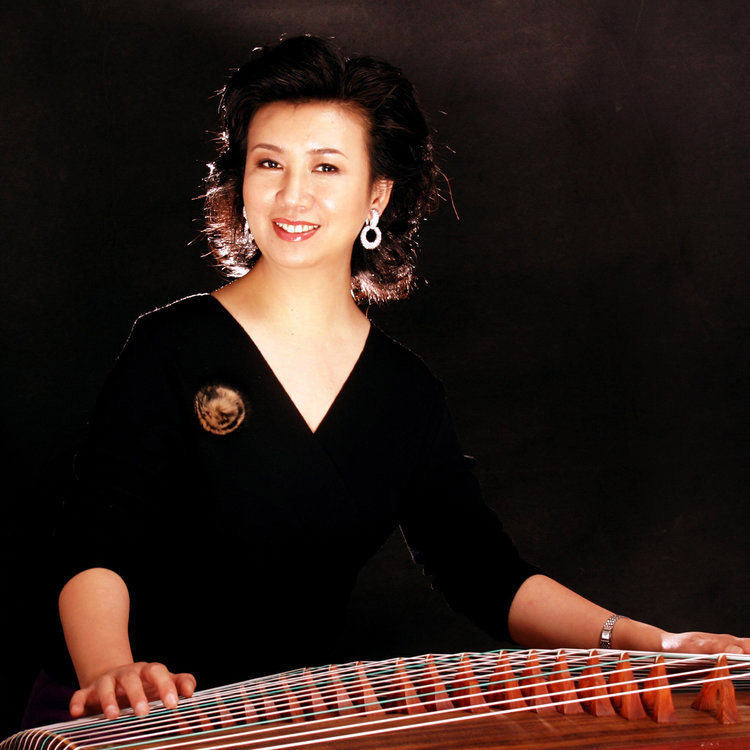 Zhou Wang (guzheng)
Zhou Wang (guzheng)Zhou Wang (guzheng)

A respected performer of the Shanxi Zheng genre, Zhou Wang is a Professor of Guzheng at the China Central Conservatory of Music, and the Director of the Chinese Music Department of CCOM. She also serves as Vice President of the China Guzheng Society.
Zhou Wang learned from her father, the world class musician in the Qin Zheng Shanxi genre Zhou Yanjia. She then studied with Maestros Zicheng Gao, Zheng Cao, Sihua Xiang, Xiuming Yang, Shange Fan, and Zhaoyuan Shi, combining north-south flavors and inheriting the true art of Zheng playing from different genres. Joining the Central Song and Dance Troupe in 1977, Zhou Wang has been an active performer in China and abroad. She was invited by the National Record Association to record The Tune of Qin Mulberry, a classical masterpiece of Shanxi genre.
As a musical ambassador and a soloist, she has toured internationally on behalf of the Ministry of Culture on many occasions. As a scholar of musical exchange, she has given lectures at institutions including the Massachusetts Institute of Technology. In 2014, she held a Zheng recital at Carnegie Hall.
Zhou Wang has served as judge and chairperson for many national and international competitions: the Golden Bell Award, Mandarin Award, Central China Television, National Chinese Instrument Competition, and Hong Kong International Zheng Competition. In over forty years of teaching, she has been dedicated to fostering many outstanding young guzheng players, who have won prizes in major competitions around the world. Many of them continue careers as educators to teach the younger generations.
In promoting Chinese music, Professor Zhou Wang has published recordings of many core classical repertoires such as High Mountain and Running River and albums featuring traditional guzheng solo works of several traditional genre classic pieces: Famous Melody of the North, Geniuses Traditional Zheng as well as many internal course teaching materials for the China Central Conservatory of Music. Her publication, Qin Zheng Qin Ren Qin Sheng, has been widely cited in Chinese musical journals.
Zhou Wang also arranges and composes traditional and contemporary Zheng musical works. She arranged the Shanxi genre Zheng pieces Huan Music, Lao Long Cries the Sea and Ming Fei’s Resentment (a guzheng and erhu duet). Together with Professor Zhenyu Huang, she has composed the contemporary Zheng pieces Fantasia in the West, Reflection, and Slowly Voice. -
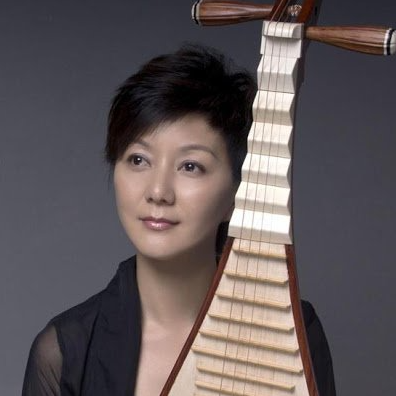 Zhang Hongyan, pipa
Zhang Hongyan, pipaZhang Hongyan, pipa

Zhang Hongyan is an outstanding contemporary Chinese pipa performer and educator. She is a professor and doctoral supervisor at the Central Conservatory and serves as dean of the Department of Traditional Instruments and the Cultural Heritage Protection and Research Center. She is a guest professor at the Art Institute of Beijing University, honorary academician of Beijing Normal University–Hong Kong Baptist University United International College (UIC), and director of the Central Institute of Vocational and Technical Education in China. She has also been a visiting scholar at Columbia University.
Zhang studied under Zhang Shijun, Sun Weixi, and Lin Shicheng, beginning her studies when she was seven years old. In 2011, she created a weeklong pipa festival, presenting four concerts of solo, chamber, ensemble, and concerto performances, essentially summarizing all of classical pipa music. In connection with the festival, Zhang also published a research paper, “Boat Against the Current: The Feeling of a Musician Today.” This festival and her paper were among the most important musical events at the start of the 21st century in China. Zhang, also known as Pipa Walker, has performed at such venues as Carnegie Hall, Lincoln Center, Kennedy Center, Berlin Philharmonic Hall, Vienna’s Golden Hall, St. Petersburg’s Mariinsky Theatre, and Suntory Hall in Tokyo. As a soloist, she has played with world-class orchestras such as the Bavarian Radio Symphony Orchestra, Israel Philharmonic, Brazilian Symphony, and Tokyo Philharmonic. In recognition of her contributions to traditional Chinese music, her album House of Flying Daggers is part of the permanent collection at the Library of Congress in Washington, D.C.
Zhang founded the national orchestra of the Central Conservatory of Music, and has won many awards in China and internationally for music education, including the Yang Xuelan Music Education Award, Baosteel Education Fund Outstanding Teacher Award, and more. -
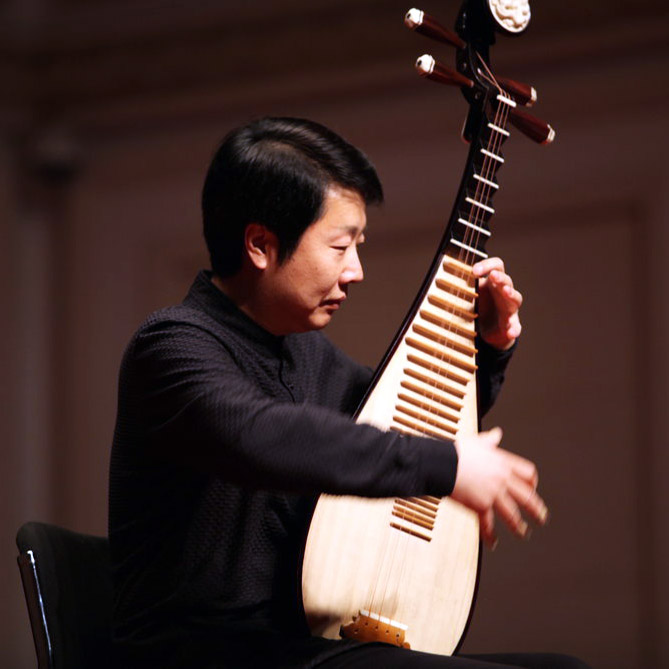 Zhang Qiang (pipa)
Zhang Qiang (pipa)Zhang Qiang (pipa)

A world-famous pipa virtuoso, Professor Zhang Qiang is the Director of the String Instrument Division of the Chinese Music Department at the China Central Conservatory of Music (CCMO).
After graduating from CCMO in 1987, Professor Zhang had devoted himself to teaching at CCMO as a pipa instructor for almost three decades. He has been a judge at major domestic and international instrumental music competitions and has been invited to give lectures at many educational institutions. In addition to his traditional approach in systematic technique training, Professor Zhang focuses on the cultivation of students' music awareness and strongly urges his students to explore and display personal character in performing. Many of his students stand out as national winners of China’s highest-level competitions.
Professor Zhang is an active performer throughout China and abroad. He has regularly appeared in international music festivals: the Edinburgh International Festival, Huddersfield Contemporary Music Festival, Tanglewood Music Center Festival of Contemporary Music, Berlin Art Week, Torino Art Festival, and other festivals held in mainland China, Taiwan, Hong Kong and Macao. His musical collaborations also include the St. Petersburg Philharmonic Orchestra, Orpheus Chamber Orchestra, Brooklyn Symphony Orchestra and China National Symphony Orchestra, Dutch New Orchestra, China Symphony Orchestra, Hong Kong Philharmonic Orchestra, China Radio National Orchestra, Shanghai National Orchestra, Hong Kong Chinese Orchestra, Taipei National Orchestra, Guangdong National Orchestra, Macau Chinese Orchestra and Singapore Chinese Orchestra. He was invited to perform at Carnegie Hall, Berlin Philharmonic Concert Hall, Musikverein (Golden Hall in Vienna), Lincoln Center in New York City. His work features solo pieces for pipa, concertos, traditional repertoires, and he actively engages in contemporary chamber music.
Professor Zhang maintains a lifelong devotion to academic research. Together with three professors from CCMO, he has been working on a historical preservation project, Xian Suo Bei Kao, imparing, performing and eventually completing the full-scale (1814 manuscripts) music on the ancient spectrum of the Qing Dynasty. -
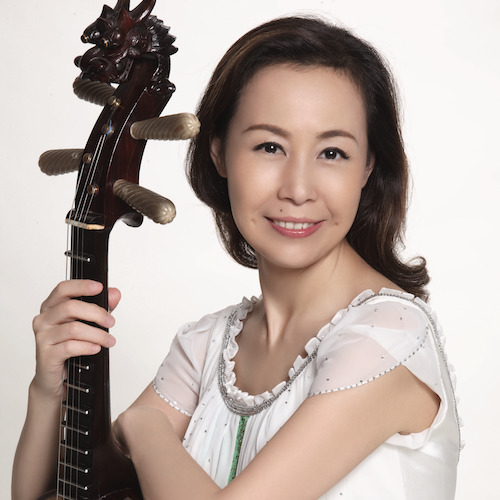 Xu Yang (ruan)
Xu Yang (ruan)Xu Yang (ruan)

Xu Yang, the leader of contemporary ruan scholars in China, performer, educator, professor and doctoral supervisor at Central Conservatory of Music in Beijing, China.
Ms. Xu is the associate director of ruan profession committee in China Nationalities Orchestra Society (CNOS), the committee of the national professional skill appraisal expert association, the executive director of Chinese Music Instrument Society, the committee of Chinese Music Instrument Qualification Exam Council, artist director of Ruan Family Orchestra at Central Conservatory of Music, the founder and executive director of Ruan Family at The Ocean of Music instrument company, the director of Xu Yang Ruan Family International Cultural Research Institute. She had studied with Pang Yuzhang, Lin Jiliang, Ning Yong. Yang has published few ruan text books and ruan recordings, such as "The best way to learn is learn from the best - Ruan Tutorial" Book 1 and 2, "Central Conservatory Ruan Qualification Exam Repertoire", "Chinese National Ruan Qualification Exam Repertoire", "Happy Learning Ruan - Study with Famous Teacher!", "The Rhythm of the mountain", etc. Over more than 40 Xu's students were winning in different national and international Chinese Music competitions, and many of the students have became ruan professor in different schools and also professional ruan players in the professional orchestras. In view of her outstanding artistic innovation ability and teaching achievements, Ms. Xu has won several awards, including selected into the ministry of education's program called "Outstanding Backbone Teacher Supporting Program" in 2009; the "Excellent Gardener Award" from the youth vanguard team of the central league and the foreign exchange center of the ministry of culture, the "Excellent Instructor Award" from "The Talented Musicians Raising Program" in 2016, central conservatory BOB excellent instructor, the title of "Outstanding Performer" in 2018. -
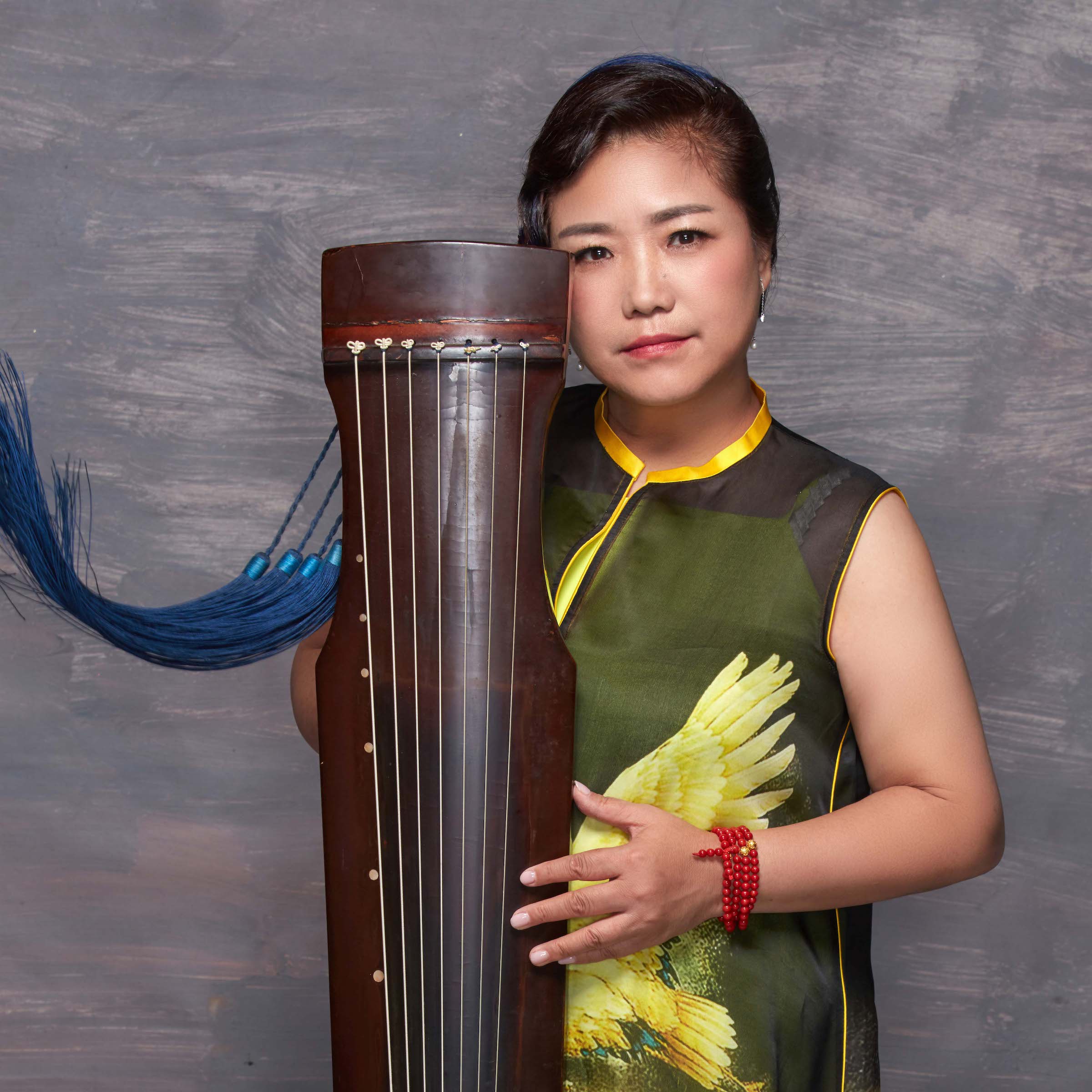 Zhao Jiazhen (guqin)
Zhao Jiazhen (guqin)Zhao Jiazhen (guqin)

Zhao Jiazhen is a professor of guqin in the Traditional Music Department at the Central Conservatory of Music in Beijing, China. She studied at the Central Conservatory, graduating in 1984. Zhao has performed with the Chinese Symphony Orchestra, Film Orchestra of China, Beijing Symphony Orchestra, Brussels Symphony Orchestra of Belgium, and National Orchestra of Taipei City. In 2001 and 2002 she performed in the “World Renowned Musicians and Instruments Concert” at Zhong Shan Hall inside the Forbidden City in Beijing, featuring three priceless guqins from the Tang Dynasty and five Guarneri and Antonio Stradivari violins. Zhao has performed in films such as The History of the Three Kingdoms, Dream of the Red Chamber, Swordsman, Fire on Yuanming Yuan, and Wu Ze Tian. She has also produced more than 10 albums of guqin music. At the 10th annual Independent Music Awards, her album Qin: Masterpieces of Chinese Qin from the Tang Dynasty to Today won best album in the World Traditional Music category. -
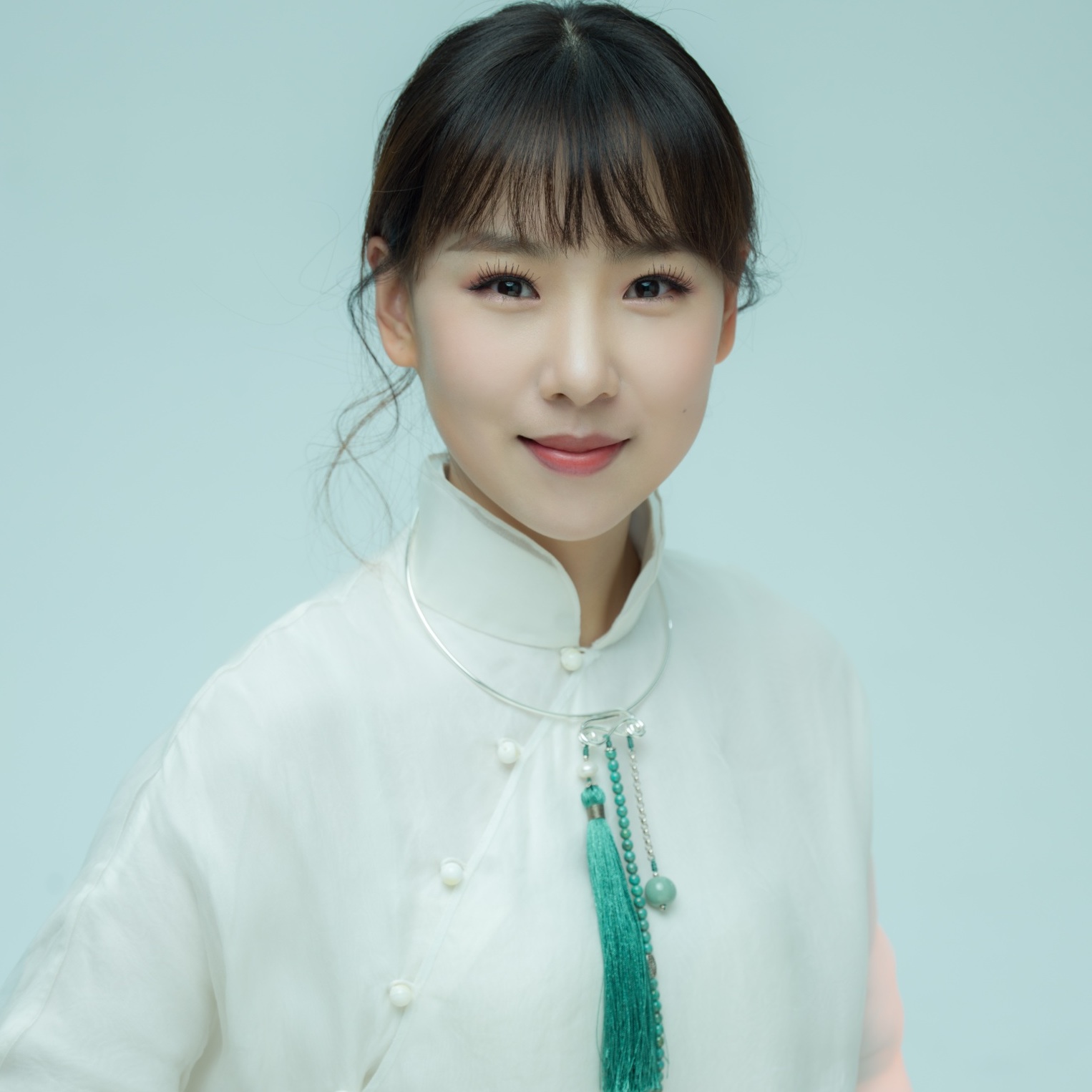 Chen Yan (erhu)
Chen Yan (erhu)Chen Yan (erhu)

Chen Yan is a young professor of erhu in the Central Conservatory of Music’s Traditional Instruments Department. A performer in the Shanghai Chinese Orchestra, she graduated from Shanghai Conservatory of Music with bachelor’s degree, and received her master’s degree at the Central Conservatory of Music. Chen Yan has won many awards, such as the Silver Award of the Youth Group in National Erhu Competition; the Silver Award of the Youth Group in the Second CCTV National Instrumental Music Competition; Second Prize of the Youth Group in the “Wenhua Cup”; and the Excellent Professional Prize from Shanghai Art Talents. She has performed as an Erhu soloist in the Opening Ceremony of the Shanghai Spring International Music Festival many times. In 2009, she premiered a Carmen Fantasia adaptation arranged for Chen by Franz Waxman. In 2011, she premiered Zhang Chao’s concerto Tribute to the Sun at the Beijing Concert Hall, winning “Best New Artist Prize” of the Fourth Ethnic Art Exhibition and the “Best New Artist Performance Prize” of the Shanghai Spring International Music Festival. In recent years she has visited the United States, Germany, and Australia on tour with the Shanghai Chinese Orchestra.
-
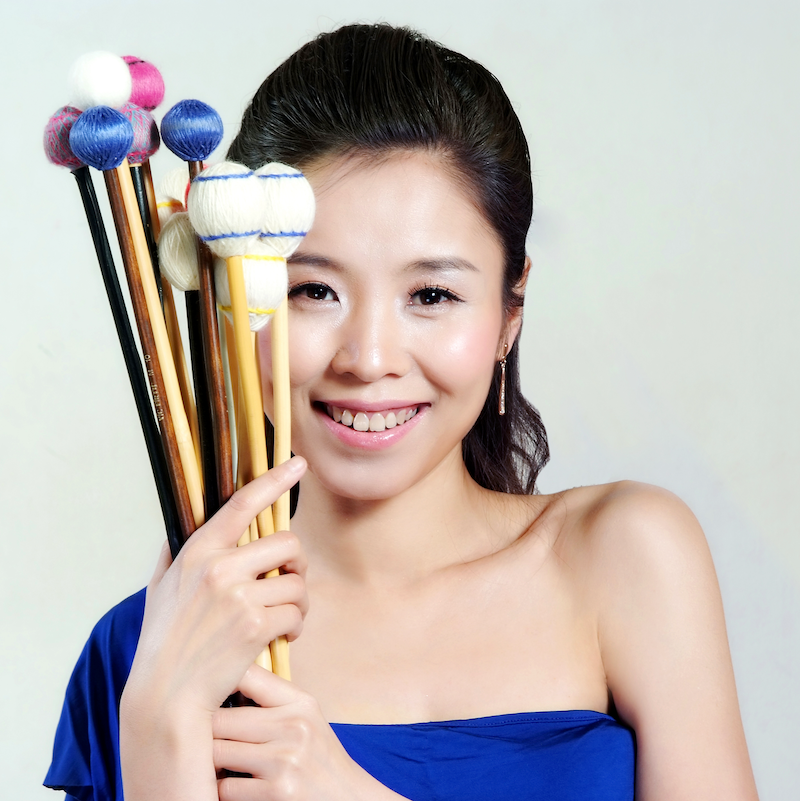 Qiao Jia (Chinese percussion)
Qiao Jia (Chinese percussion)Qiao Jia (Chinese percussion)

When she was eleven years old Qiao Jia passed the audition to be a percussion student at The Central Conservatory of Music in Beijing. Years later she graduated and became a classical Chinese percussion teacher at the same institution, which she still holds today. She has devoted herself to the performance of contemporary music written for her by Asian and western composers. Her knowledge of both traditions and her enthusiasm for new challenges enables her to perform different aesthetics of today’s music with formidable ease, accuracy and passion. She is considered one of the best Asian percussionists of contemporary music. In September 2008, Qiao realized a long tour in Scandinavia, closing it with a concert at the New Opera House in Copenhagen. In this tour she world-premiered three pieces that the audience greatly acclaimed and led to a huge success of this tour. In the summer of 2017 she participated as a faculty member in the US-China Music Institute Summer Academy and joined the USCMI faculty in 2022. -
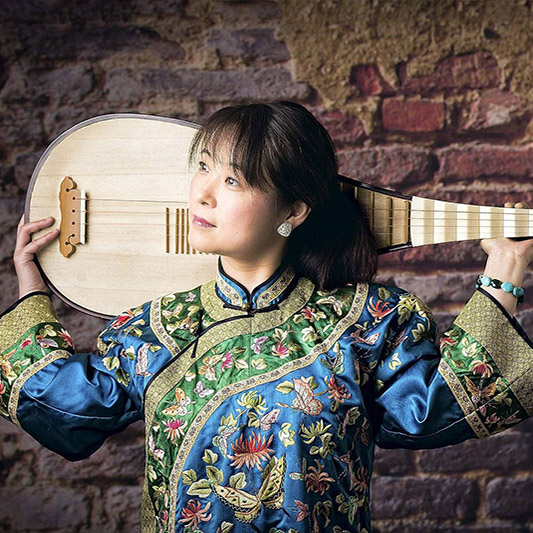 Wu Man (pipa), Master Classes
Wu Man (pipa), Master ClassesWu Man (pipa), Master Classes

Recognized as the world’s premier pipa virtuoso and leading ambassador of Chinese music, Wu Man has carved out a career as a soloist, educator, and composer, giving her lute-like instrument—which has a history of over 2,000 years in China—a new role in both traditional and contemporary music. Through numerous concert tours Wu Man has premiered hundreds of new works for the pipa, while spearheading multimedia projects to both preserve and create awareness of China’s ancient musical traditions.
-
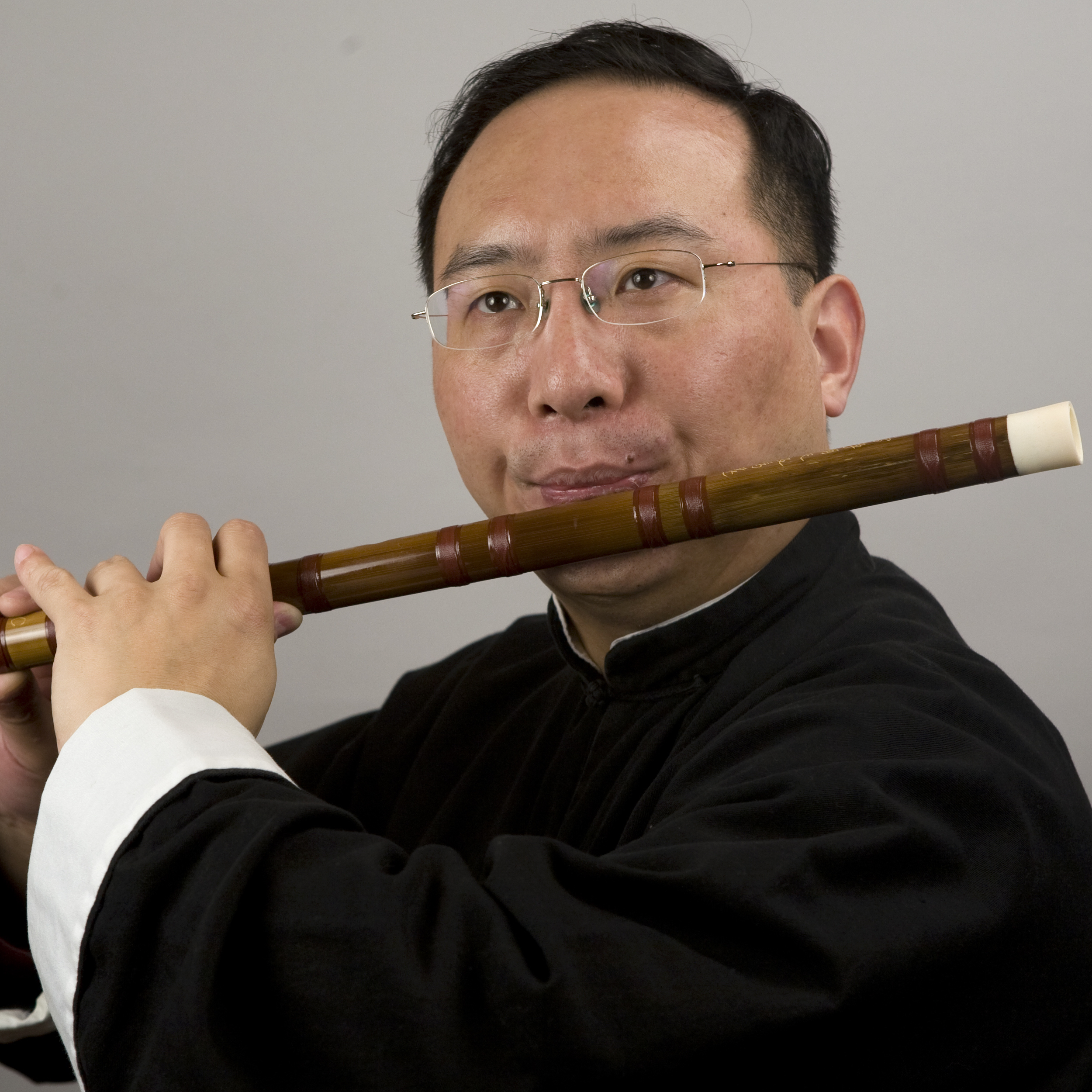 Chen Tao (dizi)
Chen Tao (dizi)Chen Tao (dizi)

Chen Tao is an internationally acclaimed Chinese flutist, music educator, composer, and conductor of Chinese orchestra; founder and director of Melody of Dragon, Inc., and of Melody of Dragon & the Youth; artistic director and conductor of the Chinese Music Ensemble of New York and conductor of New Jersey Buddha’s Light Youth Chinese Orchestra; artistic director of New York Guqin Association; and executive chairman of the New York Chinese Music Instruments International Competition since 2015. He is also a 27th-generation musician of Zhi-Hua Buddhism music. The New York Times called Chen Tao a “poet in music” and his playing “a miracle of the oriental flute.” Conductor Herbert von Karajan praised him as an artist who “performs with his soul.”
A graduate of the Central Conservatory of Music in Beijing, Chen Tao was the winner of the 1989 National Folk Instrument Competition in China and has toured the United States, Germany, Italy, France, England, Holland, Singapore, and elsewhere. He has collaborated with the BBC Philharmonic and National Orchestra of Lyon. His playing can be heard on soundtracks of Hollywood movies including Seven Years in Tibet, Corrupter (with the New York Philharmonic) and on the PBS documentary Under the Red Flag. Since coming to the United States in 1993, Chen Tao has been invited to perform and lecture throughout the country. His second Flute Recital was performed in Carnegie Hall by the New York Flute Club in 2001. He has performed at Lincoln Center and the New Jersey Performing Arts Center with groups such as the Manhattan School of Music’s Chamber Orchestra, Nai-Ni Chen Dance Company, and H. T. Chen Dancers. China Institute in America has invited him to perform and lecture on the Chinese flute since 1995. The World Journal and Tsingtao Daily have called him “king of the flute.”
As a music educator, Chen Tao has been leading Melody of Dragon in collaboration with the Midori & Friends Foundation to develop Chinese music culture in elementary schools and high schools throughout the New York metropolitan area. He joined the US-China Music Institute faculty in 2019 as master teacher of the dizi.
-
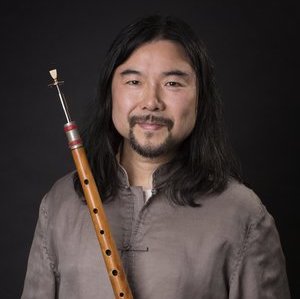 Yazhi Guo (suona)
Yazhi Guo (suona)Yazhi Guo (suona)

Yazhi Guo is regarded by many as the finest suona player in the world, and his expressive performances and unique style have created many opportunities in the world of modern music for the instrument. He is a visiting artist and teaches master classes at Philadelphia University of the Arts and Berklee College of Music, as well as at the Bard Conservatory of Music.
Guo graduated with distinction from the Central Conservatory of Music in Beijing in 1990 and for nine years lectured on suona there. He has won many international awards, including the grand prize at New York’s International ProMusicis Award (1998). Named as one of China’s most outstanding musicians by its Ministry of Culture, he was invited to give a solo performance with suona and saxophone for the heads of states during President Clinton’s visit to Beijing in 1998. In the 1990s, he recorded the original songs for more than 100 films and popular TV series, and drew a huge following of fans. Guo was appointed as principal suona by the Hong Kong Chinese Orchestra in 1999. Since then, he has performed with many orchestras around the world, including Orchestra de la Suisse Romande (Switzerland), South Korea Daejeon Philharmonic Orchestra, Belgium’s Flanders Symphony Orchestra, Malaysia Chinese Orchestra, Singapore Chinese Orchestra, and National Chinese Orchestra of Taiwan. He also lectured at the Hong Kong Academy for Performing Arts and led the Hong Kong Suona Association as its first executive director.
Guo received the Hong Kong Award for Best Artist in 2012 and that same year, at age 46, said farewell to the highly competitive position of principal suona in the Hong Kong Chinese Orchestra and relocated to Boston to explore jazz at Berklee College of Music. While studying at Berklee, he actively showcased the uniqueness of suona on various occasions and made the traditional suona more fashionable and popular. After graduating from Berklee with an artist diploma in 2015, he led Berklee’s jazz band during its visits to China and Singapore; he also performed in many other cities and gave college lectures. His fusion-style jazz performances were highly received by Chinese and American audiences. -
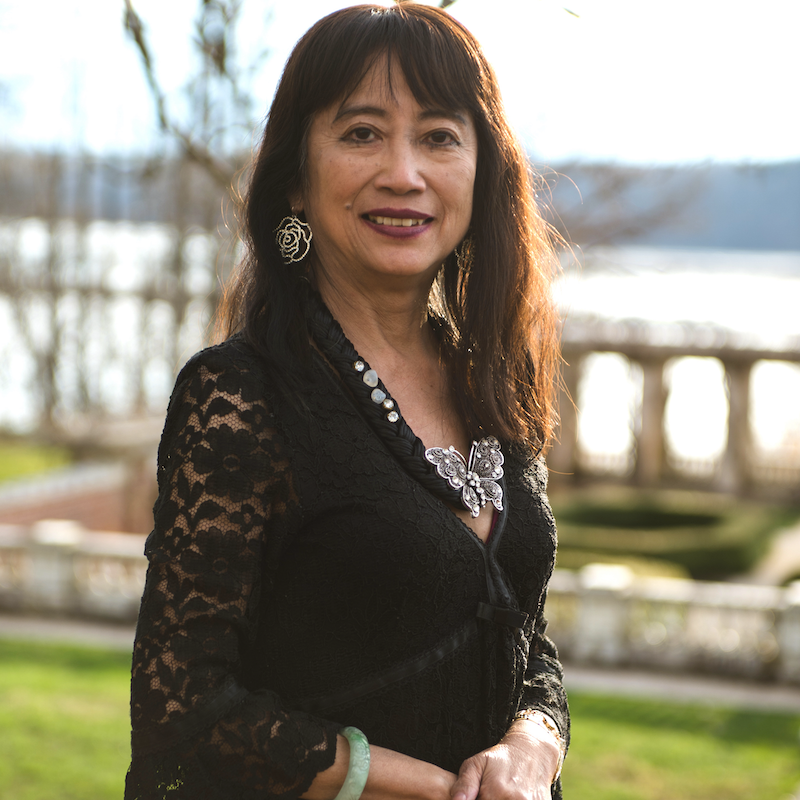 Mingmei Yip, Chinese Music History and Culture
Mingmei Yip, Chinese Music History and CultureMingmei Yip, Chinese Music History and Culture

Mingmei Yip received her PhD in musicology from the University of Paris (Sorbonne) on a full scholarship from the French Government. A master performer on the Qin, she has given lectures and performances at venues such as the Metropolitan Museum of Art, Carnegie Hall, the New York Philharmonic, Columbia University, Oxford University, Shanghai Conservatory of Music, Beijing University, the University of Paris, Amsterdam University, Oberlin Conservatory, the Cleveland Museum of Art, and the China Institute in New York. Dr. Yip has served as consultant for Beijing’s Chinese Qin Association 北京中国古琴会, director for Chinese Kun Opera and Guqin Research Association 中国古琴昆剧研究会理事, artistic consultant for New York Cultural Art Association, as well as on the academic board of the Chengdu International Qin Conference.
Also a writer, Dr. Yip has published fourteen books, with two on the qin. Her latest and 7th novel The Witch’s Market (Kensington Books) which received a glowing review from the New York Times. She wrote columns for seven major newspapers and has appeared on over 50 television and radio programs in Hong Kong, Taiwan, China, and the United States.
She is also accomplished as a painter and calligrapher. A one-person show of her paintings of Guan Yin (the Chinese Goddess of Compassion) and calligraphy was held at the New York Open Center Gallery in SoHo in 2002. Dr. Yip was lecturer and senior lecturer (associate professor) of music at Chinese University of Hong Kong and Baptist University respectively, and in 2005, an International Institute of Asian Studies fellow in Holland researching on the qin. She has taught qin playing and calligraphy at two major Hong Kong Universities.
-
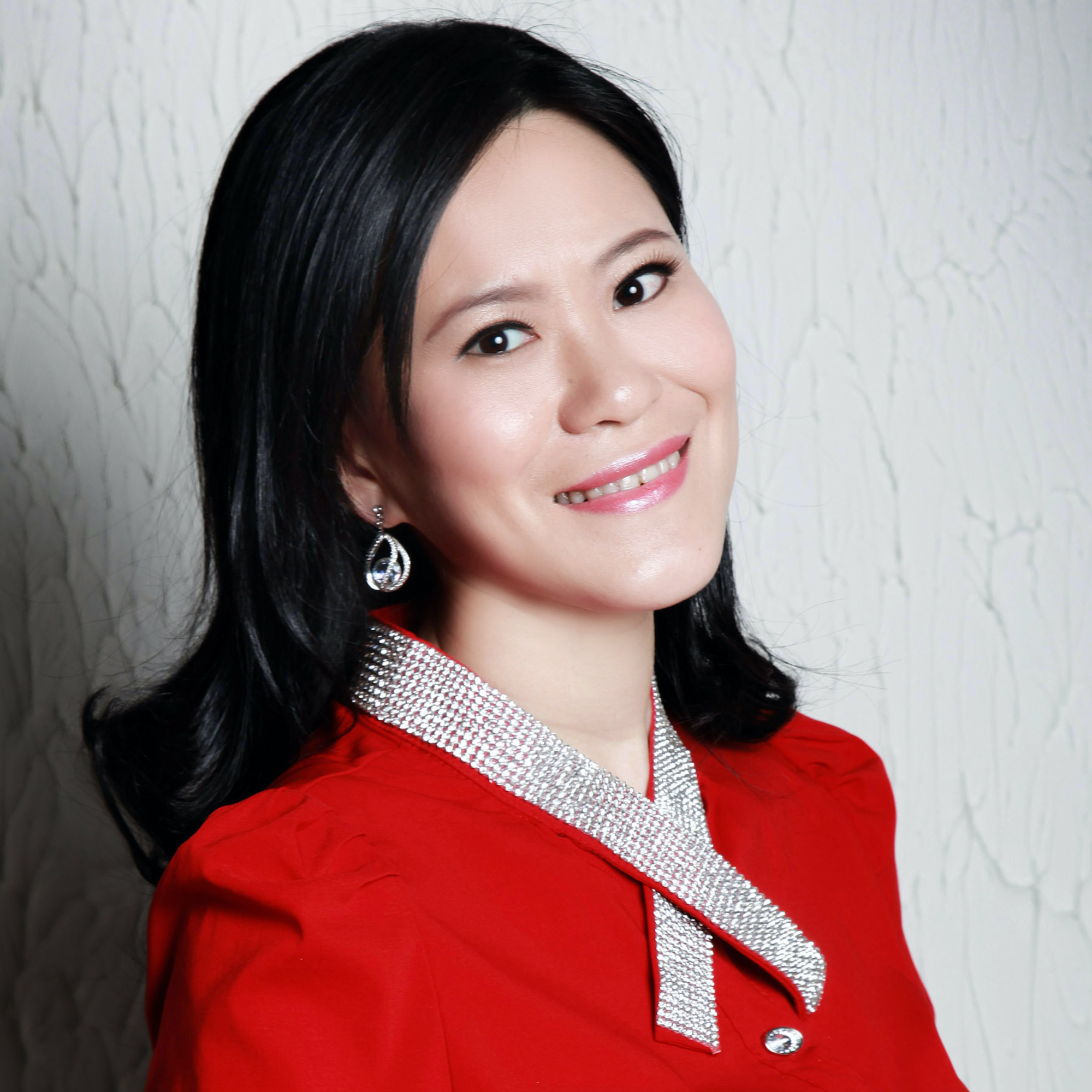 Xinyan Li, Chinese Music History and Composition
Xinyan Li, Chinese Music History and CompositionXinyan Li, Chinese Music History and Composition

Born in Qiqihar, China, Dr. Xinyan Li received her doctoral degree in composition at University of Missouri-Kansas City Conservatory of Music and Dance. She earned her bachelor’s and master’s degrees at China Conservatory of Music in composition and music theory.
Dr. Li’s music works have been featured at Aspen Music Festival, Carnegie Hall, National Opera Center, Composers Now Festival, the 89th Music Mountain Festival, the 11th Beijing International Chamber Music Festival, the 13th Thailand International Composition Festival, the 19th Nordic International Bassoon Symposium, the 44th and 45th IDRS Annual Conference, Seal Bay Festival, and China’s National Center for the Performing Arts. She was invited as a visiting composer by Aspen Music Festival in 2007 and 2015; her interview and six works have been broadcasted by Sweden’s national radio—Sveriges Radio in 2011; her wind quintet Mo Suo’s Burial Ceremony was released by Albany Records in 2019, performed by Pan Pacific Ensemble; her music composed for Laozi’s Dao De Jing, translated by Ken Liu, has been released by Audible in 2022; her three chamber works were published by TrevCo Music Publishing. Her music has been performed by Omaha Symphony, musicians of Eighth Blackbird, PRISM Quartet, American Composers Orchestra, The Orchestra Now, Bergen Woodwind Quintet, Cassatt String Quartet, Earplay, Quintet of the Americas, Donald Sinta Quartet, Music From China, as well as principal musicians of Philadelphia, Baltimore, Detroit, St. Louis, Montreal, Bergen Orchestras and Danish Chamber Orchestra. Her awards include ASCAP Morton Gould Young Composer Award, American Composers Orchestra New Music Readings, Tsang-Houei Hsu International Music Composition Award, IDRS Conference 2016 Schwob Prize in Composition, and LunArt Festival Call for Scores.
As a native Chinese, Dr. Li has conducted field research on folk songs, folk chorus and ethnic instrumental music of various minorities, such as Dong, Miao, Yi, and Zhuang in southwest China, as well as Mongolian and Daur in northeast China. She has also extensively studied roles, singing styles, and instrumental music of Beijing Opera and Kunqu. Rooted in Chinese music and culture, she composed a duet for qingyi and xiao, a chamber concerto for hualian and chamber orchestra, a septet for guqin, guanzi, and five western instruments, a trio for flute, pipa, and cello, and a quartet for flute, pipa, erhu, and percussion. These compositions have been performed by virtuosos Zhihou Hu, Zhang Qiang, Zhou Yi, Shenshen Zhang, Guowei Wang, Chen Yue, Huang Mei, as well as Beijing Opera actress Zhu Hong and actor Qingxian Liu.
Dr. Li has taught composition and music theory at New York Philharmonic Orchestra’s Very Young Composers Program, University of Missouri-Kansas City, and China Conservatory of Music. Her composition students have been accepted by the Pre-College Division of The Juilliard School, Mannes School of Music, and Berklee College of Music. She has given music lectures at Grieg Academy-University of Bergen in Norway and Adelphi University in New York. As a pianist, she is skilled in playing improvisation piano accompaniment. She has worked with Metropolitan Opera conductor Gregory Buchalter, New England Conservatory professor Karen Holvik, and Chinese singer Gong Linna.
Personnel
人事
-
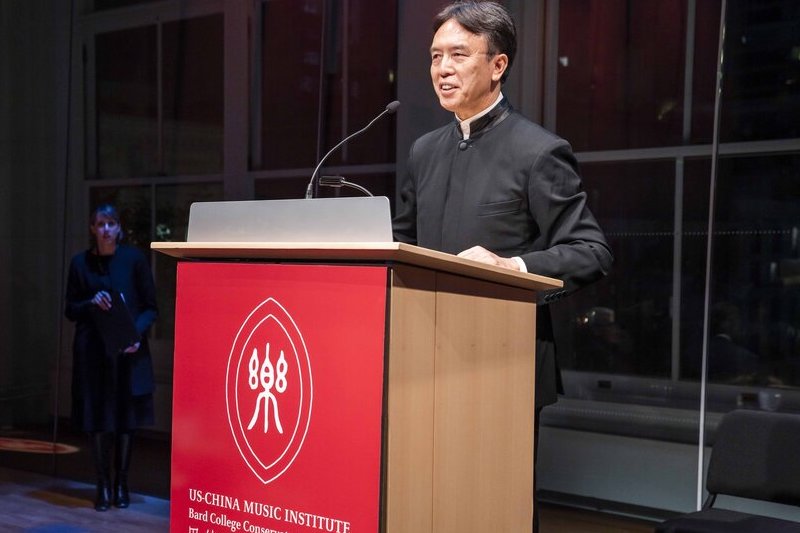 Administration
Administration
行政Jindong Cai, Director, US-China Music Institute; Chair, Master of Arts in Chinese Music and Culture 蔡金冬,美中音乐研习院院长,中国音乐与文化艺术硕士项目主任
Kathryn Wright, Managing Director 行政总监
Hsiao-Fang Lin, Director of Music Programming 林小芳,音乐项目总监
Shutong Li, Assistant Conductor; Artistic Director, Bard Chinese Ensemble 李梳曈,助理指挥与巴德民乐室内乐艺术总监
Wenrui Shi, Recruitment Coordinator 史文睿,招生协调员
Beitong Liu, Graduate Program Coordinator 刘倍彤,研究生项目协调员 -
Artistic Council
艺术委员会Yu Hongmei , Distinguished Artistic Advisor 于红梅, 杰出艺术顾问
Wu Man, Artistic Advisor 吴蛮, 艺术顾问
Xavier Bouvier
Chen Yi 陈怡
Han Mei 韩梅
Marianne Jacobsen
Martha Liao
Robert Martin
Ye Xiaogang 叶小纲
Yu Long
Zhang Xian
Zhou Long 周龙
Contact Us
US-China Music Institute
Bard College, PO Box 5000
Annandale-on-Hudson, NY 12504-5000
[email protected] | 845-758-7026
Bard College, PO Box 5000
Annandale-on-Hudson, NY 12504-5000
[email protected] | 845-758-7026












